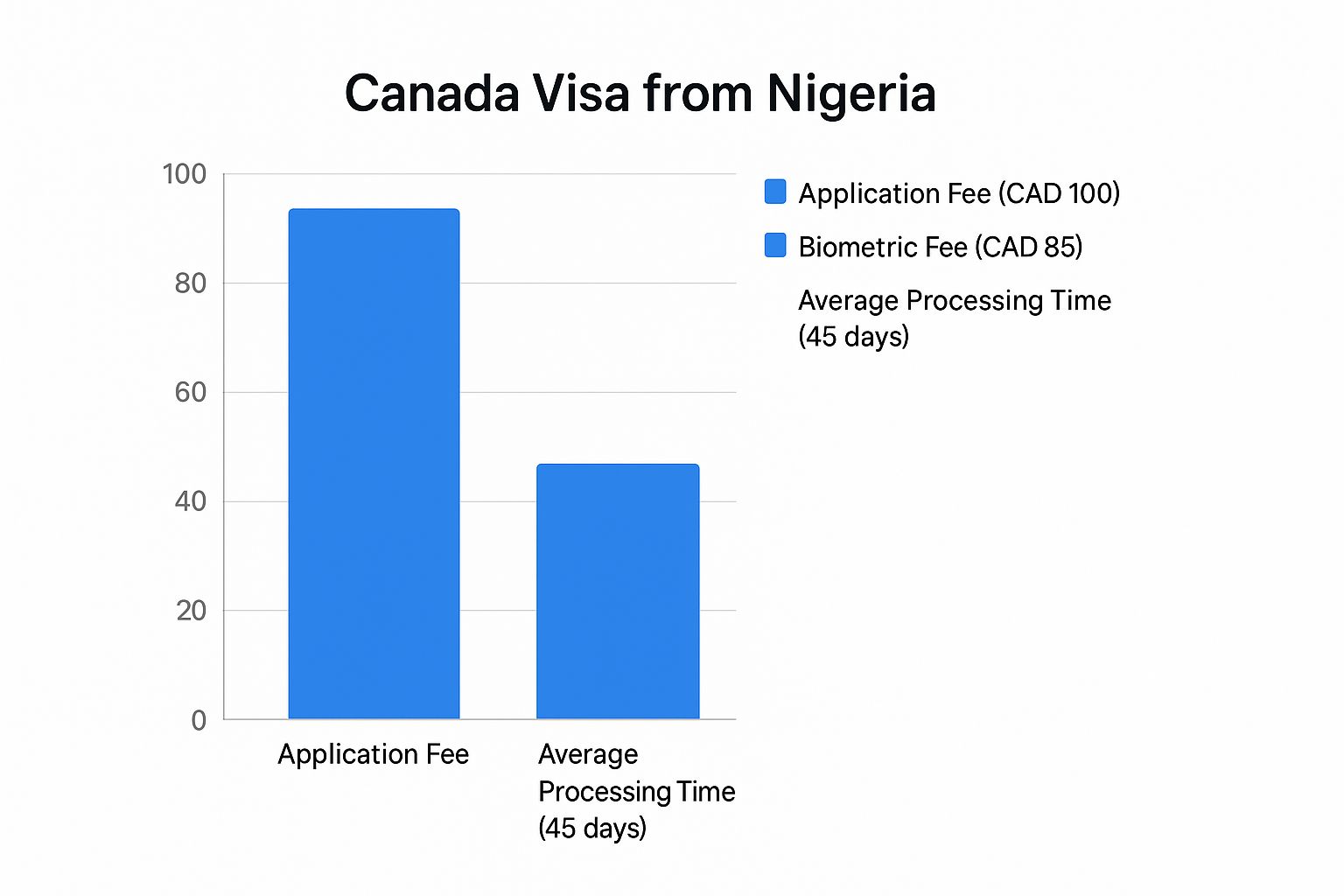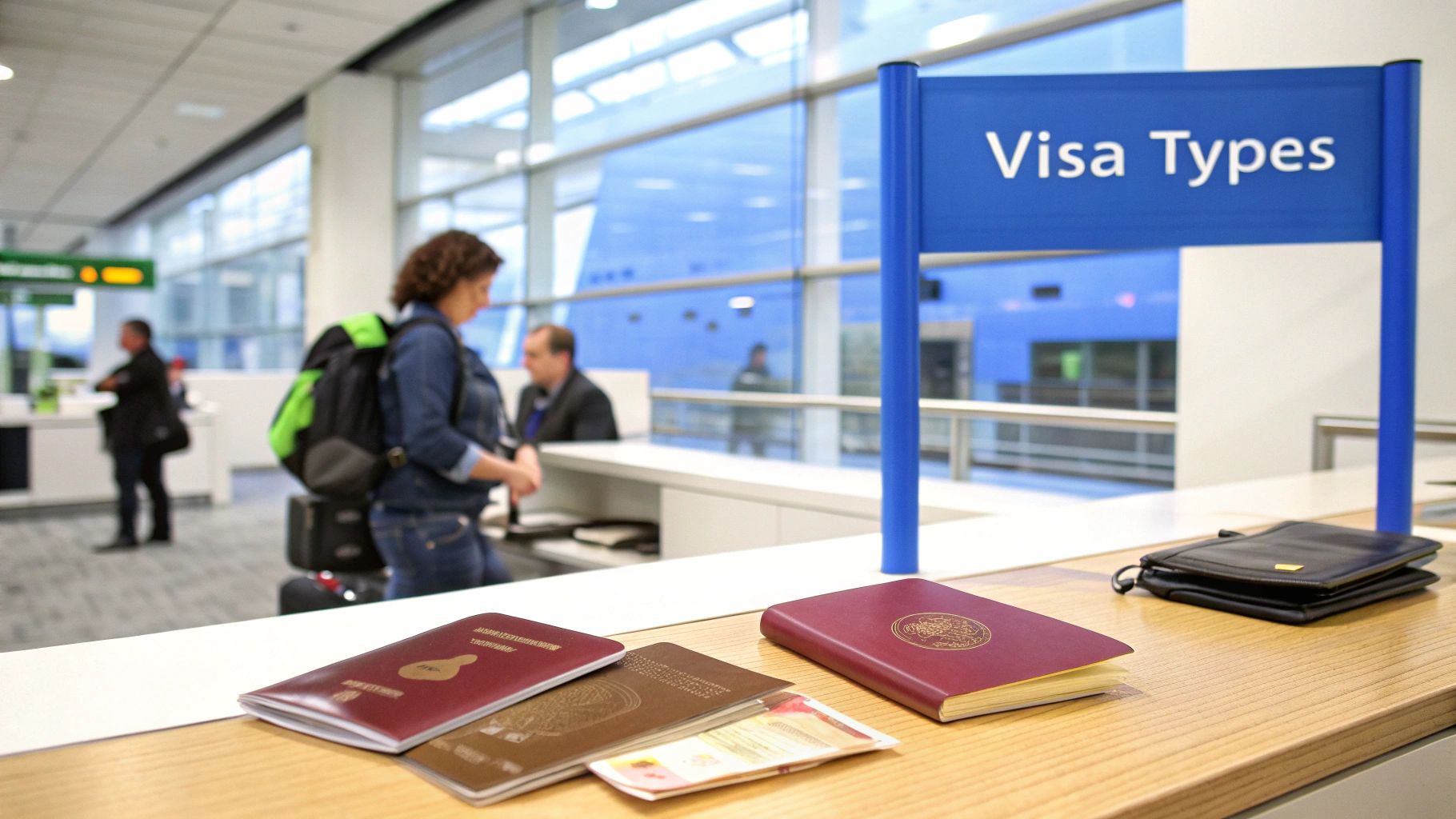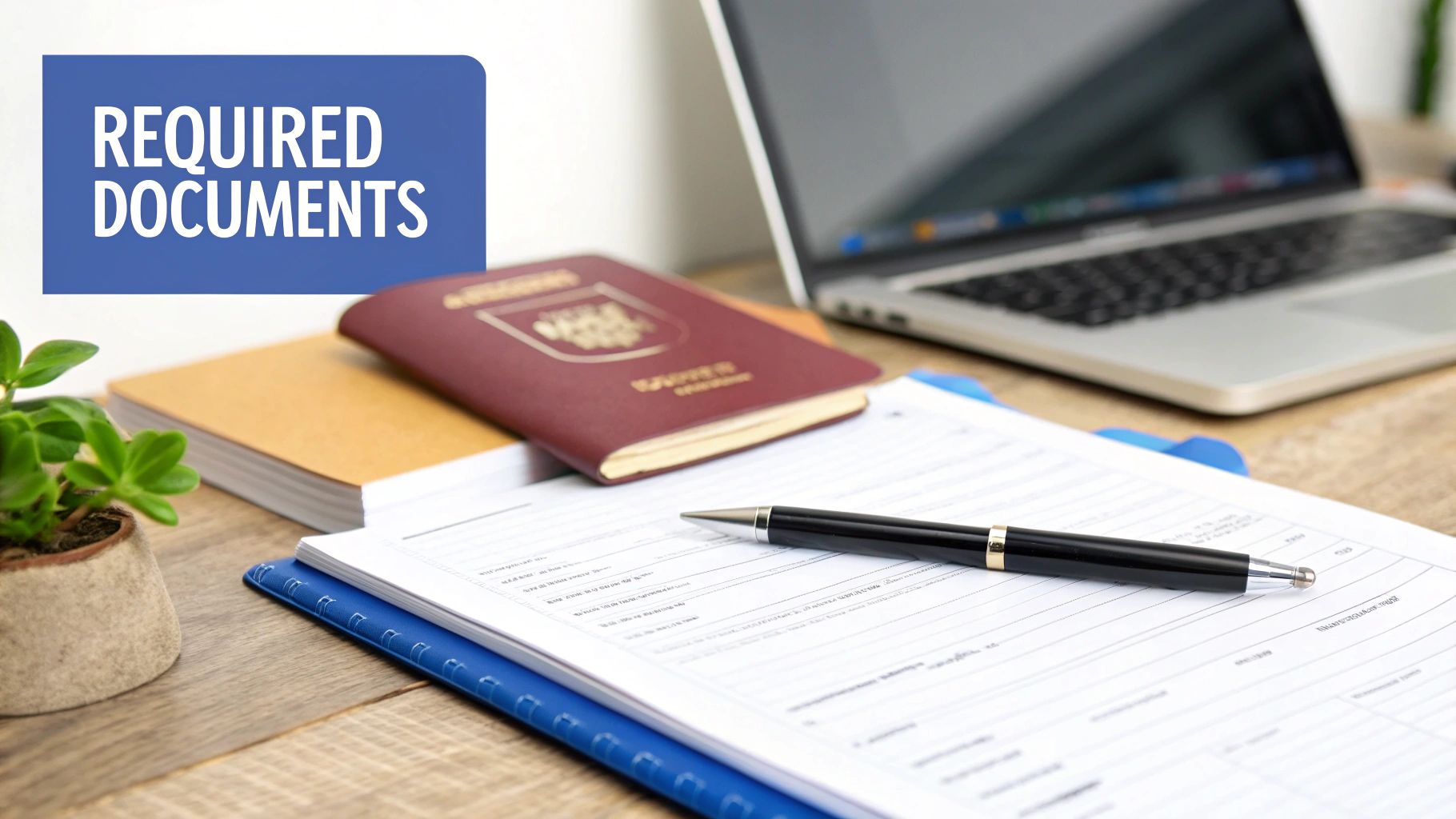How Much Is Visa from Nigeria to Canada? Complete Cost Guide

When people ask about the cost of a Canadian visa from Nigeria, there's no single, simple answer. At its most basic, for a standard visitor visa, you’re looking at a CAD $100 application fee and a mandatory CAD $85 biometrics fee. But that total shifts depending on whether you're applying to work, study, or just visit.
Understanding Your Initial Visa Investment
Think of budgeting for your visa like planning a big trip. You have your main, non-negotiable costs—the ticket price, in this case—and then you have all the other expenses that come with it. The Canadian government's fees are that initial ticket price. They are the fixed costs every applicant has to cover, and they form the base of your entire budget.
Getting a handle on these initial numbers is the very first step in planning your finances for the move. Here’s a quick visual breakdown to help you see what those core costs look like for a temporary visa.

As you can see, the application and biometrics fees are two separate, essential payments you need to account for right from the start.
The Core Components of Your Visa Fees
Your first payment to the Canadian government is really two charges rolled into one:
- Application Fee: This is the charge for the time and effort it takes for an officer to review your application.
- Biometrics Fee: This covers the cost of having your fingerprints and photograph taken at a Visa Application Centre (VAC).
To give you a clearer picture, here's a high-level overview of the main government fees for popular Canadian visa types, quoted in Canadian Dollars (CAD) to help you budget.
Summary of Core Canadian Visa Fees for Nigerian Applicants
| Visa Type | Application Fee (Per Person) | Biometrics Fee (Per Person) |
|---|---|---|
| Visitor Visa | CAD $100 | CAD $85 |
| Study Permit | CAD $150 | CAD $85 |
| Work Permit | CAD $155 | CAD $85 |
Keep in mind, these fees are just the beginning. To avoid any nasty financial surprises down the road, it’s a good idea to understand the full cost of relocating from Nigeria to Canada, which covers everything from flights to proof of funds. Getting the complete picture now will save you a lot of stress later.
Visitor and Student Visa Fees Unpacked

So, you're planning a trip to Canada, either for a short visit or to start your studies. Excellent! The first step is getting a handle on the initial government fees. It helps to think of it like buying an airline ticket: there's the main ticket price (the application fee) and then a mandatory service charge (the biometrics fee). You'll need to pay both to get your application off the ground.
If you're applying for a visitor visa—officially called a Temporary Resident Visa (TRV)—the application fee is CAD $100 for each person. For those heading to school, the study permit application will set you back CAD $150. The higher cost for a study permit simply reflects the more complex review process involved.
Understanding the Biometrics Fee
Now, on top of that base application fee, almost every applicant from Nigeria aged 14 to 79 needs to provide biometrics. This is a straightforward process where you visit a Visa Application Centre (VAC) to have your fingerprints and a photo taken.
The standard biometrics fee is a non-negotiable CAD $85 for an individual. You must pay this fee at the same time as your main application fee.
Let's do the maths. A single person applying for a visitor visa will pay a total of CAD $185 upfront (CAD $100 + CAD $85). A student's initial cost comes to CAD $235 (CAD $150 + CAD $85).
Special Considerations for Families and Groups
Here’s a small bit of good news for families. If a family of two or more applies for visitor visas together at the same time, Canada caps the total biometrics fee at CAD $170. It’s a nice little saving that can make a family trip slightly more affordable.
Of course, these temporary visas have a different purpose and cost structure than long-term immigration paths. If you're interested in employment opportunities, you should check out our guide on the https://blog.japachat.com/canada-work-visa-permit/ to see its specific requirements.
Ultimately, getting a clear picture of what your visa will cost starts right here: identify your visa type and add these two core fees together.
The True Cost of a Canadian Work Visa

When you start asking, "how much is a visa from Nigeria to Canada for work?", you're really asking about a shared investment. It's a financial partnership between you and your future Canadian employer, and understanding the full picture shows you just how serious a commitment a job offer truly is.
Let's start with your part of the deal. As the applicant, the main costs on your plate are the work permit application fee and the biometrics fee. Think of these as your direct, personal expenses to get the ball rolling. These fees are set by the Canadian government, so there's no getting around them.
What Your Employer is Paying
Now, let’s talk about the side of the equation most applicants never see: the employer's costs. The fees a Canadian company pays to hire you are significant, and they reveal a deep level of commitment. These are not just small administrative charges; they are major investments.
A huge part of this is the Labour Market Impact Assessment (LMIA). Many work permits require this step, where the employer has to prove to the government that hiring you won't harm the Canadian job market. It's a complex and expensive process for them to undertake.
The total cost of a Canada work visa from Nigeria goes well beyond what you pay out of pocket. Your personal cost starts with a CAD $155 work permit fee and a CAD $85 biometrics fee. But your employer is often looking at a much bigger bill, including a CAD $1,000 LMIA fee and a CAD $230 employer compliance fee.
Seeing these numbers, it’s clear why Canadian businesses take this process so seriously. For a deeper dive into the entire journey, check out our guide on how to apply for a work visa.
Thinking about making Canada your permanent home? It's a huge step, and the financial side of things reflects just how big a decision it is. When people ask, "how much is a visa from Nigeria to Canada" for permanent residence (PR), they quickly see the costs are a big jump from temporary visas.
Think of these fees less like a simple purchase and more like laying the foundation for your new life. For most economic PR routes, such as Express Entry, you'll face two main costs: the application processing fee and the Right of Permanent Residence Fee (RPRF). These are serious, non-refundable charges, which is exactly why getting your application perfect the first time is so important.
Breaking Down the PR Fees
The final amount you'll pay really depends on which immigration program you use and who's coming with you. For the economic streams, the costs are clear-cut, but they are significant.
For example, if you're applying for permanent residence from Nigeria to Canada through Express Entry, the processing fee and the Right of Permanent Residence Fee (RPRF) together come to CAD $1,525 for just the main applicant. Family sponsorship is a different ball game. To sponsor a spouse or partner, you’re looking at a CAD $85 sponsorship fee, a CAD $545 processing fee, and a CAD $575 RPRF, which totals CAD $1,205.
It's always a good idea to check out the detailed fee breakdown on the IRCC website to see the exact costs for your specific situation.
Sponsoring Family Members
For many, the dream of moving to Canada isn't complete without bringing family along. The fee structure is designed to account for every person you include in your application.
Remember, every family member you add to your application has their own fee. For instance, including a dependent child in any PR application will add CAD $175 per child to your total bill.
Getting your budget right from the start is a massive part of the process. Knowing these figures upfront helps you plan properly, so when you’re ready to start your journey to permanent residence, there are no last-minute financial surprises.
Budgeting for Expenses Beyond the Application Fee

The official government fees are really just the tip of the iceberg. To get a realistic picture of what it costs to get a Canadian visa from Nigeria, you have to factor in all the other expenses that pop up before you can even click "submit" on your application.
Think of it this way: the visa application fee is like buying a ticket to a concert. That ticket gets you in the door, but it doesn't cover your transport to the venue, your outfit, or any refreshments. Similarly, these extra costs are essential for building a complete and convincing visa file.
These aren't optional extras; they're non-negotiable requirements that prove you're eligible and ready for your new life in Canada.
Your Pre-Application Financial Checklist
Before you get to the main visa payment, you’ll need to tick off several items on your to-do list, and most of them come with their own price tags. Consider these crucial investments in your application's success.
-
Medical Examination: This is a big one. You must get a medical check-up from a specific, IRCC-approved doctor in Nigeria. It’s a mandatory step to show you're medically admissible to Canada, and you'll pay the clinic directly for this service.
-
Police Certificates: Canada needs to know you don’t have a criminal record that would prevent you from entering the country. This means getting official police clearance certificates, which involves a fee.
-
Language Tests: For many study permits and pretty much all economic immigration pathways (like Express Entry), you have to prove your English or French skills. This means booking and paying for a test like IELTS or CELPIP.
-
Educational Credential Assessment (ECA): If you're applying for permanent residence as a skilled worker, you can't just show your Nigerian degree certificate. You need an official assessment from a designated organisation to see how your education stacks up against Canadian standards. This service isn't free.
One of the most significant financial hurdles is the Proof of Funds. This isn't a fee you pay to anyone, but rather a substantial amount of money you must prove you have sitting in your bank account. It’s your way of assuring the Canadian government that you can take care of yourself (and your family) when you first arrive.
As you line up all these payments, don't forget about bank charges and transfer fees. It’s wise to look for the cheapest way to send money internationally to make sure you're not losing money unnecessarily along the way.
How to Securely Pay Your Visa Fees from Nigeria
Alright, you’ve gathered your documents and filled out the forms. The last major step before you can hit 'submit' is paying the visa fees. This part can feel a bit daunting, but the Canadian government has made it a pretty secure and clear process.
For most people applying from Nigeria, the simplest way to pay is online. You'll do this directly on the official Immigration, Refugees and Citizenship Canada (IRCC) website right as you're submitting your application. It’s quick, efficient, and integrated into the process. To make sure everything goes off without a hitch, understanding secure payment methods is a great first step.
The IRCC portal is set up to accept major credit cards and some specific debit cards. Here’s a key thing to remember, though: not all Nigerian debit cards are automatically set up for international online payments.
Making a Successful Payment
A failed payment can be frustrating and cause unnecessary delays. To sidestep any issues, here are a few practical tips to check off before you pay:
- Use the Right Card: The system accepts Visa, Mastercard, and American Express credit cards. If you're using a debit card, it usually needs to be a Visa Debit or Debit Mastercard, and your bank must have enabled it for international use.
- Check Your Transaction Limits: Many Nigerian banks have a default daily limit on international spending. Call your bank and ask what your limit is. If the visa fees are higher, you'll need to ask them for a temporary increase for the transaction.
- Enable Foreign Transactions: This is a big one. You have to explicitly confirm with your bank that your card is authorised for online payments to international merchants. A quick phone call to customer support is usually all it takes.
What if you're applying in person? In some cases, you might be instructed to pay your fees at a Visa Application Centre (VAC). The VACs in Lagos and Abuja have their own specific payment rules. They often accept payments through Point-of-Sale (POS) machines or may require a bank draft. It’s absolutely essential to check the specific VAC's website or contact them directly to confirm how they accept payments before you go.
Common Questions About Canada Visa Costs
Let's face it, figuring out the financial side of a Canadian visa application can be confusing. You need clear, straightforward answers to budget properly and feel confident about your application. So, let’s tackle some of the most common questions we hear from Nigerian applicants about the costs involved.
One of the first things people ask is what happens to their money if the visa application gets denied. It’s crucial to know that the main processing fees you pay are non-refundable. This fee covers the cost of having an officer review your file, regardless of the final decision.
The big exception here is the Right of Permanent Residence Fee (RPRF). If you’ve paid this upfront and your permanent residence application doesn't go through, you will get the RPRF portion of your payment back.
Answering Your Key Fee Questions
Many applicants wonder about specific costs and payment rules. Getting these details right is key to planning your budget, so let's clear up a few things.
- Are visa fees refundable? In short, no. The application and processing fees are for the service of reviewing your file, so they won't be returned even if your visa is refused.
- How much is the biometrics fee? The biometrics fee is CAD $85 for an individual. If you're applying as a family of two or more, the maximum you'll pay is CAD $170. This is a mandatory fee for most Nigerian applicants between the ages of 14 and 79.
- Is proof of funds really needed for a visitor visa? Yes, absolutely. You have to prove to the visa officer that you can cover your trip. This means showing clear evidence, like bank statements, that you can afford your flights, accommodation, and daily spending money without any intention of working in Canada.
- Can I pay in Nigerian Naira? All fees are set in Canadian Dollars (CAD). When you pay online through the official IRCC portal, your Nigerian bank will convert the amount from your Naira account using its current exchange rate. If you choose to pay in person at a Visa Application Centre (VAC) in Nigeria, they will have their own specific rules on how you can pay, which often includes options to pay in local currency.
Planning a move to Canada always brings up a lot of questions. For instant, accurate answers on everything from visa costs to required documents, JapaChat is here to help. As Nigeria's first AI immigration expert, we provide the clear guidance you need to plan your journey with confidence. Get started for free at JapaChat.

Leave a Reply